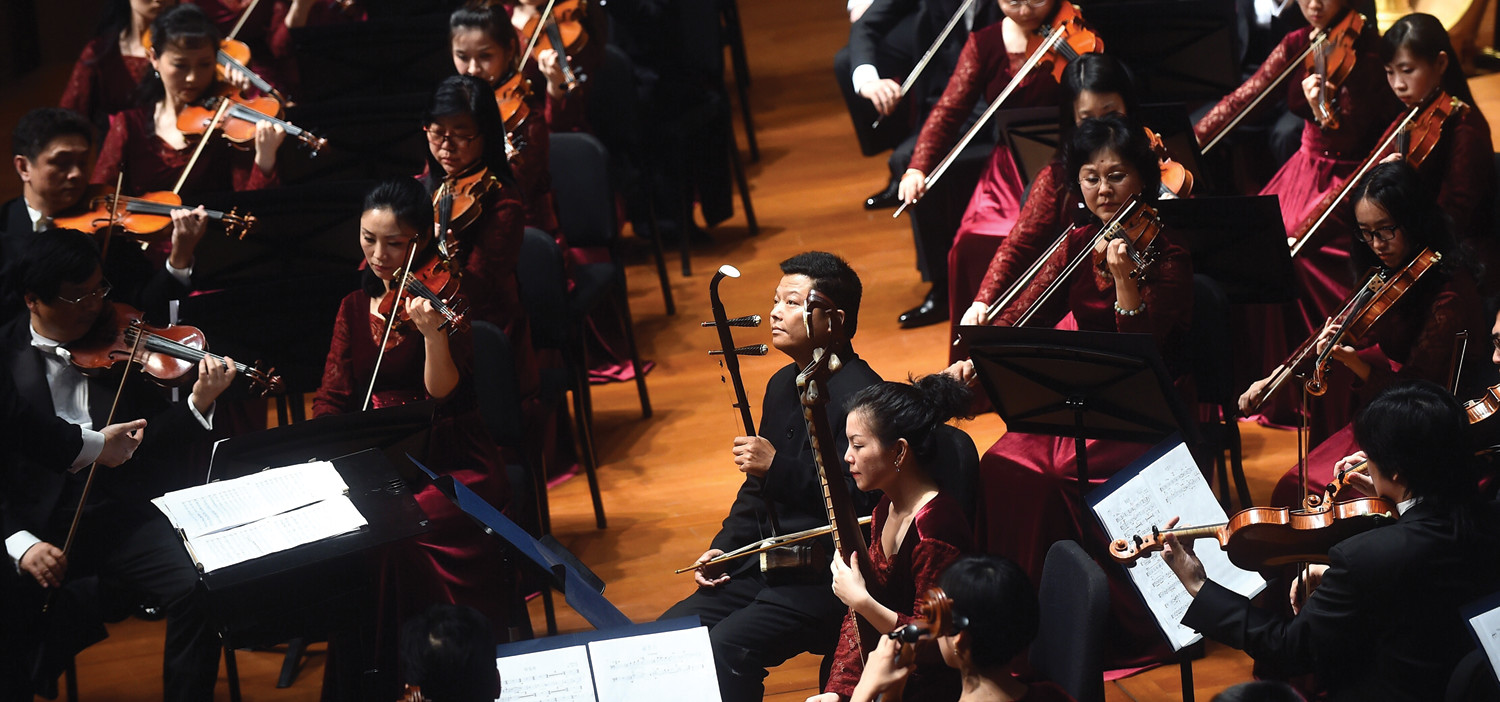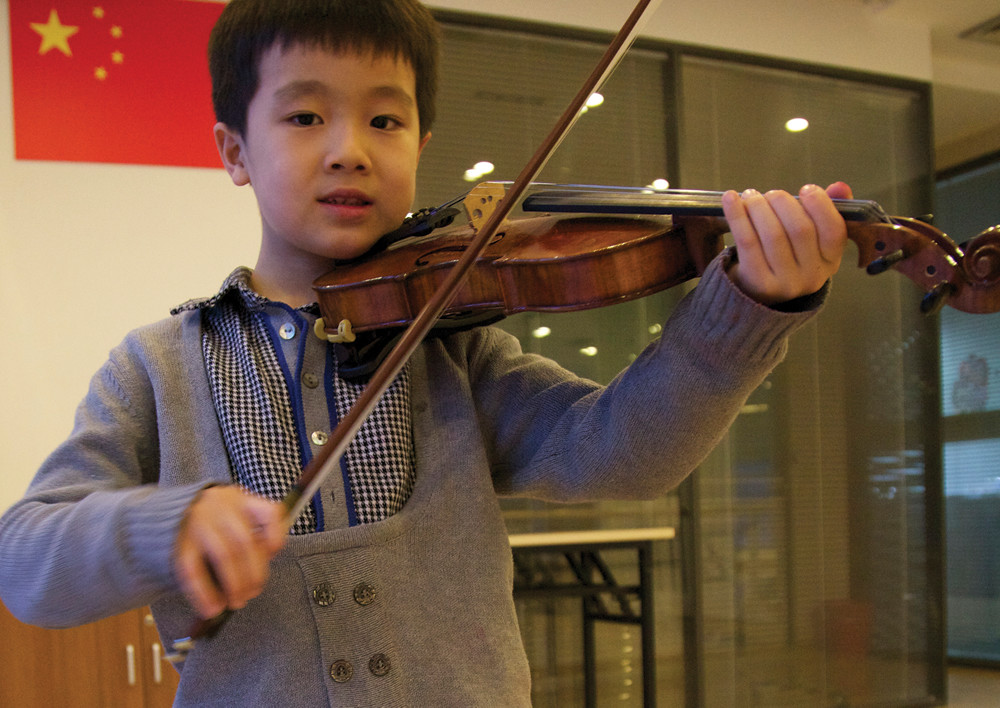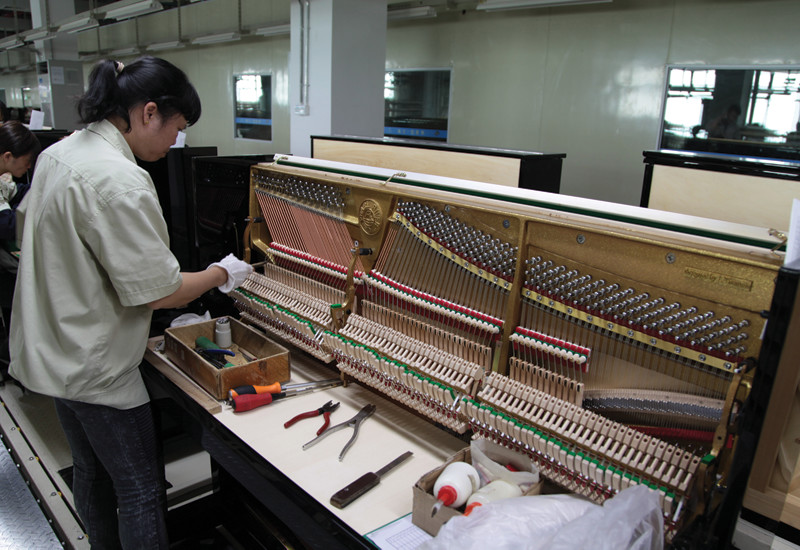China Sounds More Classical Than Ever
“This is the biggest music conservatory in the world, but in China, this is a small one.” Composer Hu Yongyan (胡咏言) points to the sixteen-storey tall building of the Central Conservatory of Music (中央音乐学院 Zhōnɡyānɡ Yīnyuè Xuéyuàn) in Beijing. The conservatory is the best education institution in the field of Western classical music in China, the home country of at least 40 million piano students.
What is the story behind the attributes ‘big’ and ‘best’ in the world of the classical music in China, where, as I used to think, everything is made, except for music? I searched for answers to this question during a recent trip to China. I was commissioned to produce a radio documentary for Dutch Public Radio.

Copyright: Xinhua
“In Holland you may have 5000 kids in total learning to play violin. In Beijing alone, we have 100,000 children learning the violin,” says Hu, a passionate composer and conductor who initially graduated from the same Central Conservatory and later studied at Yale University and Julliard School of Music in the United States of America. “If you come here at the weekend, you will see thousands of kids. They come to take exams for some kind of music certificate. The traffic police has to come onto the campus to direct the traffic...” The face of maestro Hu looks amazed. “You have never seen this before?”
I have never seen such a boom in classical music as I have seen in China. If you listen attentively, then you will hear classical music almost everywhere. I heard it in the metro, and on the street. I never thought I would hear a part of Beethoven Ninth Symphony in a Chinese pop song. Turn on the TV, start zapping, and in less than a minute you will hear that Western classical music is harmoniously mixed into everyday Chinese life. A smooth piano music accompanies a washing detergent ad and a little kid playing violin is ‘smart’ because he drinks milk from a certain brand. Piano is cool, violin is smart and classical music is fresh and trendy. This would be the dream of anyone involved in the classical music business in Western Europe.
“Rock ‘n’ roll, jazz, even Beethoven and Bach, they are all new in China,” says composer Tan Dun (谭盾), trying to find an explanation for the classical musical revival. Maestro Tan is widely known in the West for the movie scores of Crouching Tiger, Hidden Dragon (《卧虎藏龙》 Wòhǔ Cánɡlónɡ) and also for his organic classical music. In his compositions, he uses ‘organic’ sounds from materials like water and stones. Tan is one of the best examples of a success story. Born in the village of Changsha (长沙), Hunan province (湖南省), he had never heard of Bach or Beethoven before he visited Beijing. He could not even believe what a friend told him: “Bach is the father of classical music.” In April 2014, Tan will be in Holland and Germany conducting his own work Water Passion based on Bach’s Saint Matthew’s Passion.

Both Tan and Hu witnessed the period of the Cultural Revolution (1966-1976) (文化大革命 Wénhuà Dà Gémìnɡ). “It was a horror for intellectuals,” says Hu, at that time attending the elementary school in his home town Shanghai (上海). “During the Cultural Revolution, it was still possible to learn the piano or the violin, but it went more or less underground. Talking in public about classical music could lead to punishment. If you were promoting it, then you could even get imprisoned for that.” Hu, a son of professional musicians, also could see some light at the end of the tunnel. “The government produced some kind of combination between the Peking Opera (京剧) and symphony. So they still needed the western instruments and professional musicians to perform that.”
For me, it is hard to believe, that this is the same country where only some 30 years ago, during the Cultural Revolution, Western Classical music was forbidden and many classical music artists were sent to the countryside to join the working class. Since that time, nothing has remained the same in China, even the working class.
“With the growing of the Chinese economy, more and more people have big apartments with enough space for a piano,” says Xiao Wei (肖巍), Vice General Manager of the Pearl River Piano Company (广州珠江钢琴集团有限公司), the biggest piano company in the world, in Guangzhou in the south of China. “Also at this moment, most young couples have only one child and they are willing to pay a lot for their education.” This is the department where the piano keys are made. Most of the keys will be elegantly touched by Chinese fingers, but the factory also exports pianos to more than 80 countries around the world. Still, the Chinese market remains the key to their success. Some 85 percent of the pianos are sold in China itself. This means 100 thousand pianos out of 130 thousand which they make each year. But this is by far not enough for the thirsty classical music market in China. Some three hundred thousand pianos are sold every year in the whole country. This means one piano every 20 seconds.

The sound of the high-tech machines in the factory resembles the sound of handmade European wall clocks. Every second is worth a thousand sounds and the sounds reflect craftsmanship. This is not just a mass production. The factory has been increasingly raising its quality standards. Although most of the pianos they make are first entry level, the Pearl River factory is also producing its own pearls: high-end pianos such as the Ritmueller and Kayserburg brands. These pianos have the same quality as the high-end pianos made in Western Europe.
Not only the pianos but also Chinese artists have become the new brands of classical music in the world. “Every child who learns to play the piano wants to be like Lang Lang (郎朗),” says maestro Hu with a smile. Suddenly the expression in his face changes. It is no longer the face of the enthusiastic music fan. It is the face of the rigorous teacher. “Most of those who have learned piano or the violin have no experience playing for an orchestra. It is the orchestras which form the backbone of the culture,” says Hu, radiating modesty. Maestro Hu is a man of deeds. He founded the Orchestra Academy at the Central Conservatory of Beijing. He may be too modest, but he is strongly determined to further professionalise the classical music in his country.
Ever since the ban on Western Classical Music was lifted, China has, perhaps surprisingly, fully embraced this style of music and has made it their own. China’s booming economy has meant a significant increase of the numbers of parents who have the financial means for their children to receive instruction on a musical instrument associated with the classical music genre, such as the piano or violin. Idolised by many youngsters in the country, classical musicians have become icons to which these young people aspire to become in the future. It is, therefore, no surprise that China is turning heads in the world of classical music. It is the country I had seen everywhere in its products with the lable 'made in China', but before I visited China, I had never heard its classical music. I believe the future of classical music will not only be 'made in China' but also be 'played in China'. China sounds more classical than ever.
 Share on Facebook
Share on Facebook Share on Twitter
Share on Twitter Share on LinkedIn
Share on LinkedIn